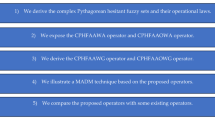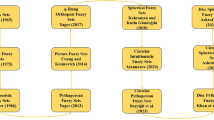Abstract
Cognitive fuzzy preference relations (CFPRs) can represent the preference information of pairwise comparisons of objects through membership and non-membership degrees in an explainable way. Nevertheless, there is a heavy burden of an expert to provide a CFPR. As an important property of preference relations, the additive transitivity has challenging points in terms of weak interpretability of thresholds, inefficient use of information, and unfair treatment of small-value inputs. In addition, it is still a challenge to analyze the information variability of experts in the additive transitivity. In this study, to reduce the burden of experts when providing pairwise preference information, we define the reciprocal cognitive fuzzy preference relation (RCFPR). The additive transitivity of an RCFPR is defined to enhance the utilization efficiency of preference information. To avoid the unfair treatment of small-value inputs, we apply the ceiling restriction in the additive transitivity conditions of an RCFPR. An additive transitivity learning model considering the risk preferences of experts is set up to identify the information variability in RCFPRs. Simulation experiments show that the absolute-error-based objective function is suitable for the additive transitivity learning model.





Similar content being viewed by others
References
Xu, Z.S.: Intuitionistic preference relations and their application in group decision making. Inf. Sci. 177, 2363–2379 (2007). https://doi.org/10.1016/j.ins.2006.12.019
Zhang, C., Liao, H.C., Luo, L.: Additive consistency-based priority-generating method of q-rung orthopair fuzzy preference relation. Int. J. Intell. Syst. 34, 2151–2176 (2019). https://doi.org/10.1002/int.22137
Jiang, L.S., Liao, H.C.: Cognitive fuzzy sets for decision making. Appl. Soft Comput. 93, 106374 (2020). https://doi.org/10.1016/j.asoc.2020.106374
Jiang, L.S., Liao, H.C.: Cognitive fuzzy preference relations and its applications in decision-making. Appl. Intell. (2022). https://doi.org/10.1007/s10489-021-03056-0
Gong, Z.W., Guo, W.W., Herrera-Viedma, E., Gong, Z.J., Wei, G.: Consistency and consensus modeling of linear uncertain preference relations. Eur. J. Oper. Res. 283, 290–307 (2020). https://doi.org/10.1016/j.ejor.2019.10.035
Herrera-Viedma, E., Herrera, F., Chiclana, F., Luque, M.: Some issues on consistency of fuzzy preference relations. Eur. J. Oper. Res. 154, 98–109 (2004). https://doi.org/10.1016/S0377-2217(02)00725-7
Liang, Q., Liao, X.W., Liu, J.P.: A social ties-based approach for group decision-making problems with incomplete additive preference relations. Knowl.-Based Syst. 119, 68–86 (2017). https://doi.org/10.1016/j.knosys.2016.12.001
Meng, F.Y., Chen, S.M., Zhang, S.L.: Group decision making based on acceptable consistency analysis of interval linguistic hesitant fuzzy preference relations. Inf. Sci. 530, 66–84 (2020). https://doi.org/10.1016/j.ins.2020.03.070
Tang, J., Chen, S.M., Meng, F.Y.: Heterogeneous group decision making in the setting of incomplete preference relations. Inf. Sci. 483, 396–418 (2019). https://doi.org/10.1016/j.ins.2019.01.021
Zadeh, L.A.: Similarity relations and fuzzy orderings. Inf. Sci. 3, 177–200 (1971). https://doi.org/10.1016/S0020-0255(71)80005-1
Melkonyan, T., Safra, Z.: Intrinsic variability in group and individual decision making. Manag. Sci. 62, 2457–2764 (2016). https://doi.org/10.1287/mnsc.2015.2255
Regenwetter, M., Dana, J., Davis-Stober, C.P.: Transitivity of preferences. Psychol. Rev. 118, 42–56 (2011). https://doi.org/10.1037/a0021150
Gong, Z.W., Tan, X., Yang, Y.J.: Optimal weighting models based on linear uncertain constraints in intuitionistic fuzzy preference relations. J. Oper. Res. Soc. 70, 1296–1307 (2019). https://doi.org/10.1080/01605682.2018.1489349
Wan, S.P., Wang, F., Dong, J.Y.: Additive consistent interval-valued Atanassov intuitionistic fuzzy preference relation and likelihood comparison algorithm based group decision making. Eur. J. Oper. Res. 263, 571–582 (2017). https://doi.org/10.1016/j.ejor.2017.05.022
Wu, Z.B., Yang, X.Y., Tu, J.C., Chen, X.: Optimal consistency and consensus models for interval additive preference relations: a discrete distribution perspective. J. Oper. Res. Soc. 71, 1479–1497 (2019). https://doi.org/10.1080/01605682.2019.1621219
Atanassov, K.T.: Intuitionistic fuzzy sets. Fuzzy Sets Syst. 20, 87–96 (1986). https://doi.org/10.1016/S0165-0114(86)80034-3
Yager, R.R., Abbasov, A.M.: Pythagorean membership grades, complex numbers and decision-making. Int. J. Intell. Syst. 28, 436–452 (2013). https://doi.org/10.1002/int.21584
Yager, R.R., Alajlan, N.: Approximate reasoning with generalized orthopair fuzzy sets. Inf. Fusion 38, 65–73 (2017). https://doi.org/10.1016/j.inffus.2017.02.005
Rivieccio, U.: Neutrosophic logics: Prospects and problems. Fuzzy Sets Syst. 159, 1860–1868 (2008). https://doi.org/10.1016/j.fss.2007.11.011
Long, Y.L., Tang, M., Liao, H.C.: Renewable energy source technology selection considering the empathetic preferences of experts in a cognitive fuzzy social participatory allocation network. Technol. Forecast. Soc. Chang. 175, 121317 (2022). https://doi.org/10.1016/j.techfore.2021.121317
Zeng, Z., Jiang, L.S., Liao, H.C.: A cognitive fuzzy evidential reasoning approach for multi-expert multi-criterion decision making. IEEE Trans. Cognit. Dev. Syst. (2022). https://doi.org/10.1109/TCDS.2022.3177414
Bezdek, J.C., Spillman, B., Spillman, R.: A fuzzy relation space for group decision theory. Fuzzy Sets Syst. 1, 255–268 (1978). https://doi.org/10.1016/0165-0114(78)90017-9
Tanino, T.: Fuzzy preference orderings in group decision making. Fuzzy Sets Syst. 12, 117–131 (1984). https://doi.org/10.1016/0165-0114(84)90032-0
Liu, P.S., Diao, H.Y., Zou, L., Deng, A.S.: Uncertain multi-attribute group decision making based on linguistic-valued intuitionistic fuzzy preference relations. Inf. Sci. 508, 293–308 (2020). https://doi.org/10.1016/j.ins.2019.08.076
Chu, J.F., Liu, X.W., Wang, Y.M., Chin, K.S.: A group decision making model considering both the additive consistency and group consensus of intuitionistic fuzzy preference relations. Comput. Ind. Eng. 101, 227–242 (2016). https://doi.org/10.1016/j.cie.2016.08.018
Li, C.C., Dong, Y.C., Xu, Y.J., Chiclana, F., Herrera-Viedma, F., Herrera, F.: An overview on managing additive consistency of reciprocal preference relations for consistency-driven decision making and fusion: taxonomy and future directions. Inf. Fusion 52, 143–156 (2019). https://doi.org/10.1016/j.inffus.2018.12.004
Acknowledgements
The work was supported by the National Natural Science Foundation of China (Grant Numbers 71771156, 71971145, 72171158).
Author information
Authors and Affiliations
Corresponding author
Rights and permissions
About this article
Cite this article
Liao, H., Zeng, Z. & Jiang, L. Identify Information Variability in Reciprocal Cognitive Fuzzy Preference Relations by an Additive Transitivity Learning Model. Int. J. Fuzzy Syst. 24, 3770–3780 (2022). https://doi.org/10.1007/s40815-022-01364-2
Received:
Revised:
Accepted:
Published:
Issue Date:
DOI: https://doi.org/10.1007/s40815-022-01364-2




